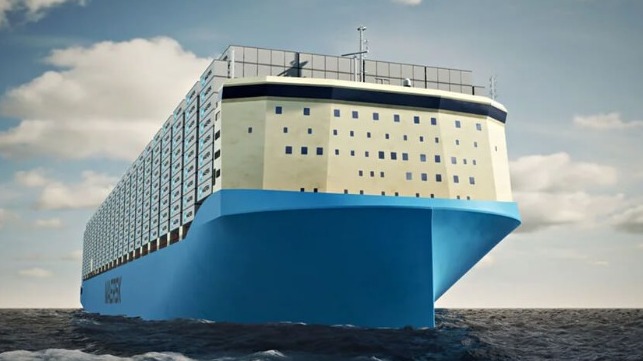Contract Awarded for Large e-Methanol Facility to Fuel Maersk’s Ships

Efforts are moving forward on building the world´s first large-scale commercial e-Methanol production facility to be located in southern Denmark. The timing of the project is being coordinated to the scheduled delivery of Maersk’s large dual-fuel methanol ready containerships with the production of the fuel scheduled to start in the second half of 2023. Last summer, A.P. Moller – Maersk announced it would partner with REintegrate, a subsidiary of the Danish renewable energy company European Energy, working closely on the development of the facility.
Danish developer and operator of green energy projects, European Energy, is developing the first large-scale commercial e-Methanol production facility with the hydrogen being provided by a 50 mega-watt electrolyzer plant that the company has now ordered from Siemens Energy. The plan is that the plant will be built in Kassø, located in southern Denmark, near the German border. Through the nearby 300 MW solar park at Kassø, also developed by European Energy, the project will have access to the low-cost renewable electricity needed to produce cost-effective e-Fuel. End-users of the e-Methanol will Maersk and the fuel retailer Circle K, among others.
“We are pleased to place this important order of what is believed to be the first large-scale commercial Power-to-X-project of its kind in the world,” said Knud Erik Andersen, CEO of European Energy. “This is a crucial moment in the green transition as we move forward with the decarbonization of hard-to-abate sectors such as the shipping industry, and we trust that Siemens Energy's outstanding know-how of electrolyzers will become a strong foundation to expand our business of delivering sustainable fuels to the world.”
European Energy projects that e-Methanol can become a critical piece in meeting the IMO’s goals for the decarbonization of the shipping industry. The company notes that global shipping consumes around 3,050 terawatt hours (TWh) of the worldwide final energy consumption. This is more than five times the total electricity consumption of Germany. As nearly all the current power is based on fossil fuels, mainly bunker oil, the shipping sector emits about 1,000 million tons of CO2 per year, about 13 percent of the greenhouse gas emissions from global transport.
Siemens Energy secured the order from European Energy for the delivery of an electrolyzer plant. They will design, supply, and commission the electrolysis system consisting of three full arrays of its latest and most powerful line of PEM (proton exchange membrane) electrolysis products including transformers, rectifiers, distributed control system (DCS) plus the equipment to produce demineralized water. European Energy as the owner of the project will be responsible for the engineering, procurement, and construction, as well as for the operation of the facility.

that matters most
Get the latest maritime news delivered to your inbox daily.
“Together with our partner European Energy, we are taking over a first mover’s role in decarbonizing the marine industry,” said Stefano Innocenzi, Senior Vice President of the New Energy Business at Siemens Energy. “With this project, we will bring e-Methanol to market at scale. E-Methanol or derived e-Fuels are predestined for long-distance ship and road transportation as well as for aviation. The project will be proof of the successful commercialization and scaling of our PEM technology.”
Last summer, Maersk highlighted that REintegrate had been pursuing the production of green e-methanol in its test laboratory in Aalborg. They said that plans call for the new facility to produce the approximately 10,000 tons of e-Methanol that Maersk’s first vessel will require annually while in service. Previously, Maersk has said that having a sufficient supply of methanol would be one of the biggest challenges for its new vessels and the company has moved aggressively to support the development of the production and infrastructure that will be required to support the conversion to the green alternative fuels.
